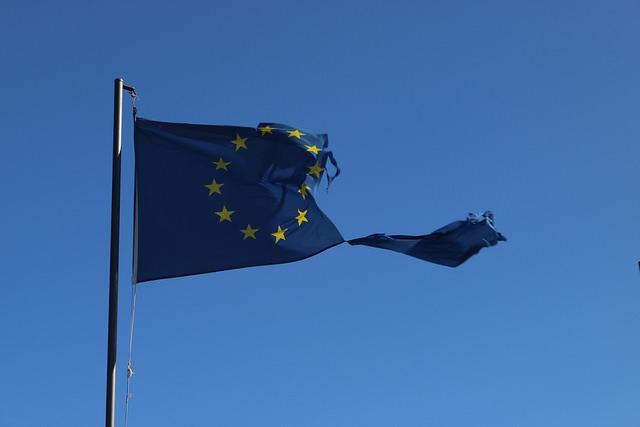Foreign policy white paper 2017: if the EU is vital, then …?
Posted By Mike Scrafton on December 1, 2017 @ 11:20

The 2017 foreign policy white paper [1] declares that a ‘strong European Union (EU) remains vital to Australia’s interests and will be an increasingly important partner in protecting and promoting a rules-based international order’. But Europe faces serious internal and external problems, and it isn’t fanciful to suggest that in a decade or so the supranational EU might not look the same.
The EU’s domestic political scene has become uncertain and volatile. Internal contradictions in the EU model—exacerbated by the slow recovery from the 2008 financial crisis, Brexit, mass unauthorised migration, and rising nationalism and nativism—have fostered political fragmentation and the failure of the traditional centre-right and centre-left parties in Europe.
Reactionary political forces were on full display [2] in Poland recently as far-right nationalists, xenophobes and racists marched in their thousands. This was an extreme manifestation of the general political shift to the right [3] in Germany, Austria, Hungary and Poland, and to a lesser extent in the rest of Europe. Europeans in general [4], not just right-wing or nationalist groups, have concerns about loss of sovereignty and the current structure and performance of the EU. The desire for a return of decision-making to national governments is strong. This unrest is fuelled by growing income inequality [5] across the EU.
There’s significant variation in public opinion among the 28 EU member states on important issues. To see the EU simply as a single entity is misleading. Although recent surveys [6] show slight improvements in public attitudes towards EU institutions, in nine European states a majority of the population don’t trust EU institutions. In five states, a majority have a negative view of globalisation, and over a third of all EU citizens perceive globalisation negatively. Politicians are acutely aware of these sentiments.
Although the white paper expresses an awareness that in Europe ‘doubts about openness to the world have grown, as have concerns about the effect of globalisation—mainly immigration—on cultural identity and social cohesion’, it also holds out the prospect of negotiating ‘an ambitious FTA with the European Union’.
Even without the problems outlined above, the history [7] of the Trans-Atlantic Trade and Investment Partnership and the persistence of a substantial core [6] of an anti-free trade faction in the EU suggests that Australia shouldn’t approach the FTA negotiations with any Pollyanna-ish optimism. The European Court of Justice has ruled [8] that any new trade agreement that goes beyond external tariff cuts, which is the case for all modern trade agreements, ‘must be ratified not only by the European Parliament, but also by all national—and some sub-national—parliaments across the EU (39 in total)’. That’s a very high bar.
As for external pressures, Russia continues to challenge the EU in a number of ways. By annexing the Crimean peninsula and encouraging ethnic Russian separatists in eastern Ukraine, Russia has demonstrated the EU’s and NATO’s impotence in defending Europe’s interests on its eastern borders. The incorporation of Crimea is irreversible without a major war, and the Donetsk People’s Republic [9] proto-state is becoming a reality on the ground. The EU’s response to Russia is complicated by its reliance on Russian energy imports [10]. Vulnerable eastern European nations with significant Russian minorities or that border Russia look on with anxiety [11].
A new triple entente [12] involving Russia, Iran and Turkey is taking shape. From Murmansk on the Barents Sea to the Gulf of Oman, there’s a wall of illiberal or undemocratic nations on the EU’s eastern flank—Russia, Belarus, Turkey and Iran—with limited commitment to the current US-dominated rules-based international order. Turkey’s rapprochement and Iran’s cooperation with Russia are based on closely aligned and complementary interests in Syria, Iraq and the Gulf.
The end of the war against the ISIS caliphate is opening up new fault lines [13] across the broader Middle East and encompassing the Levant and Asia Minor. Russia and the US are lining up with their clients, partners and allies in the struggle for dominance and influence. This is a struggle that EU members can’t ignore because of colonial history and geographic proximity. The dilemmas cut awkwardly across traditional loyalties and associations for the Europeans. As Saudi Arabia (with Israeli support [14]) vies with Iran for regional supremacy, EU relations with Turkey continue to deteriorate over human rights, and differences persist with the US over the Iranian nuclear agreement.
So, although it’s not about to implode, the European Union confronts grave challenges and uncertainties. If the EU is indeed vital to Australia’s interests, then Europe’s overall trajectory should be of great concern to policymakers.
Article printed from The Strategist: https://aspistrategist.ru
URL to article: /foreign-policy-white-paper-2017-if-the-eu-is-vital-then/
URLs in this post:
[1] 2017 foreign policy white paper: https://www.fpwhitepaper.gov.au/
[2] full display: https://www.theguardian.com/world/2017/nov/12/white-europe-60000-nationalists-march-on-polands-independence-day
[3] political shift to the right: https://www.newstatesman.com/world/europe/2017/03/rise-nationalists-guide-europe-s-far-right-parties
[4] in general: https://blogs.spectator.co.uk/2017/06/europeans-might-not-want-leave-eu-doesnt-mean-theyre-happy-status-quo/
[5] growing income inequality: https://www.oecd.org/els/soc/cope-divide-europe-2017-background-report.pdf
[6] recent surveys: http://ec.europa.eu/commfrontoffice/publicopinion/index.cfm/Survey/getSurveyDetail/instruments/SPECIAL/surveyKy/2173
[7] history: http://time.com/4319133/new-trade-deal/
[8] ruled: https://www.weforum.org/agenda/2017/01/the-six-issues-that-will-shape-the-eu-in-2017/
[9] Donetsk People’s Republic: http://www.aljazeera.com/news/2017/02/donetsk-people-republic-seeks-sense-nationhood-170217043602195.html
[10] reliance on Russian energy imports: http://ec.europa.eu/eurostat/statistics-explained/index.php/Energy_production_and_imports
[11] look on with anxiety: http://www.pewforum.org/2017/05/10/religious-belief-and-national-belonging-in-central-and-eastern-europe/
[12] triple entente: http://totallyhistory.com/the-triple-entente/
[13] opening up new fault lines: https://www.newstatesman.com/world/middle-east/2017/11/new-great-game-middle-east
[14] Israeli support: http://edition.cnn.com/2017/11/25/middleeast/israel-saudi-relations/index.html
Click here to print.